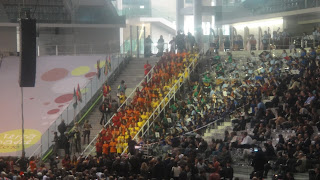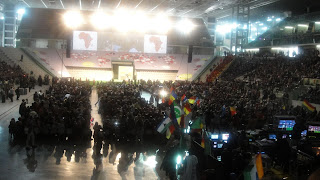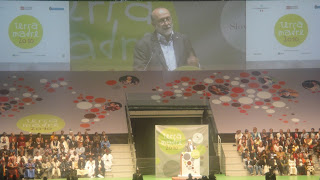
I don't know if I realized how lucky I was to attend UNISG this year until we arrived in Torino for Terra Madre and Salone del Gusto. Sure, next year the students may be able to go to Slow Cheese or Slow Fish, but Terra Madre and Salone del Gusto are by far the biggest and most important for Slow Food and it only happens every two years.
We left early Thursday morning to arrive in time for the Opening Ceremony. I felt a little overwhelmed for not having any idea what to expect from the weekend. Despite our lecture on Salone del Gusto, which really just explained the outline of the event's floor plan, fascinating, there was no way for me to be prepared. I think I am still trying to process the immenseness of the events experienced throughout the weekend.
"I don't need a pass, I'm a pecorino." - J
With passes hung around UNISG lanyards, we walked into the giant arena, Palasport Olimpico, which was originally built for the Olympics. We filled the seats as we watched people from all over the world, wearing their traditional outfits - often shoes and underpants excluded - walking around with suitcases having just arrived, chatting and introducing each other. A rainbow of coloured clothes and skins trickled in as there were kimonos with high heels, headdresses that could easily block the person sitting behind, Middle Eastern robes with Nikes, and we curiously eyed the UNISG students from Pollenzo identifiable by our new school-labeled t-shirts. Whether they were farmers, producers, musicians, educators, fishermen, chefs, students, or supportive guests, everyone was there for the same reason: as Sergio Chiampanino the Mayor of Turin said, to come together to exchange goods and ideas in order to reach a resepct that doesn't only enrich a few people. If we rearrange the hierarchy of values, not material values, we can change the world through how we relate to each other and use Terra Madre as an engine to promote these relations amongst each other.

The fourth edition of Terra Madre kicked off with 300 school children, "P
equenas Huellas" from all over the world singing with the Orchestra Internazionale Per La Pace. They sang in various languages and played while representatives from Afria, the Americas, Asia, Europe, and Oceana walked in proudly waving colourful country flags. From each of the five continents was a representative speaker addressing the audience in their native languages.
 |
| the choir and orchestra. |
Malebo Mancha Maze, a Gamo from a mountain area in Ethiopia spoke to us, loud and clear. He animatedly shared an anecdote about 5 bulls and a hyaena: 5 bulls went to the low land where the grass was nice and tasty, spending the whole day grazing. They joined their rears together in a circle with their horns facing out ready to attack. The hyaena came and said to get rid of the white bull and they would be safe forever. So, the white bull was sacrificed. One by one the pack got lighter and it was easier for the hyaena to wipe out the bulls. The lesson is, if all of us, brought together from 150 countries, embrace each other and work together, we can survive.
 |
| Africa represents. |
Adolfo Timotio from Brazil didn't look up once during his speech. He heavily stressed the process of colonization that the Guarani went through from the Spanish, Portuguese, English and Dutch who brought borders, diseases, slavery and genocide. He implored us to recognize the indigenous people and to guarantee the application of the law to them as we all are the custodians of the world - we need to look after it and make sure that all differences are respected. He was so bitter, I wonder what it was like for him to be in Italy - the colonizer.
 |
| Americas. North, Central and South. |
Albina Morilova, dressed in a traditional Kamchadal headdress, was from the extreme western part of Russia where for 7-8 months of the winter the temperatures are below 40C. Through describing her culture, she discussed the importance of conveying knowledge to new generations. Her indigenous culture has had to adopt the Russian culture and their traditional language is in danger of extinction as teachers nor youth are interested in learning or preserving it.
 |
| Asia. |
Ol-Johan Sikku is a Sami, an indigenous group from the area of Northern Sweden, Norway, Finland and the Kola Penninsula of Russia. He too talked of the exploited land that divided his people but hoped for a rivival of language, culture and land through community development. As we have borrowed from Mother Nature, he said, we can no longer live in the same nature, but we have the knowledge to work together to advise the rest of the world on how to protect it.
 |
| Europe. Yay Ireland. |
Aunty Beryl Van Oploo from SW New South Wales in Australia also talked about her indigenous culture and about a college of aboriginal culture and cuisine.
 |
| I swear the translator called this part of the world "Oceana" |
Carlo Petrini, the Slow Food International President, supported what each of these indigenous speakers had to say, agreeing that the defense of traditional knowledge gives us the tools to not only create good practices and respect nature, but we can start a dialogue to support those least considered by politics and media: natives, farmers, women, and the elderly. These humble, modest people need to show us the right way towards the future as they are the ones who preserve the earth and give the world common sense. Petrini also strongly addressed the youth in the audience who he believes have a great opportunity to match and combine modern science that we know with the traditional knowledge from our ancestors. To connect these is an extrodinary challenge, the best challenge ahead of us and the best struggle to fight for. Since we (I will consider myself part of the youth) are the subjects and creators of the transformation need, we need to grow and decrease at the same time - not only increase the development of material goods, efficiencies and profits, but to develop the love, friendship and understanding amongst people. His main three points to come away from were to enhance diversity, strengthen reciprocity, and to encourage dialogues and meetings. For Petrini, and what he wanted us all to understand and feel, was that being here, getting together for the weekend, would prove to be more valuable than all the money in the world as we open each other up to new experiences, beliefs, and languages. It will force us to go home stronger, to not only defend and expand our networks, but to live intensely.
 |
| Carlo Petrini: the man behind it all. |
It was empowering and encouraging and Petrini's energy could be felt throughout the entire arena. I left feeling like I had every capability to make a change in the world. I also left thinking that it wasn't anything new that I hadn't already read in his book, Terra Madre. Slow Food is a powerful movement but not without its problems and I understand that Petrini's speech was reinforcing the basic foundation and principles of the movement but a slight change in approach could strengthen it - if something isn't working, something can always be altered. I left unsure if I wanted to return again in two years, but the Opening Ceremony still had not prepared me for the weekend to come.
 |
| afterwards, the Greeks started dancing and Popi joined in. |
(This was all from my notes and observations from the presetation, but more information and Carlo Petrini's translated speech can be found
here.)
"Whenever I get gloomy with the state of the world, I think about the arrivals gate at Heathrow Airport. General opinion's starting to make out that we live in a world of hatred and greed, but I don't see that. It seems to me that love is everywhere. Often, it's not particularly dignified or newsworthy, but it's always there - fathers and sons, mothers and daughters, husbands and wives, boyfriends, girlfriends, old friends. When the planes hit the Twin Towers, as far as I know, none of the phone calls from the people on board were messages of hate or revenge - they were all messages of love. If you look for it, I've got a sneaking suspicion... love actually is all around." - Hugh Grant as Prime Minister in Love Actually.



























































